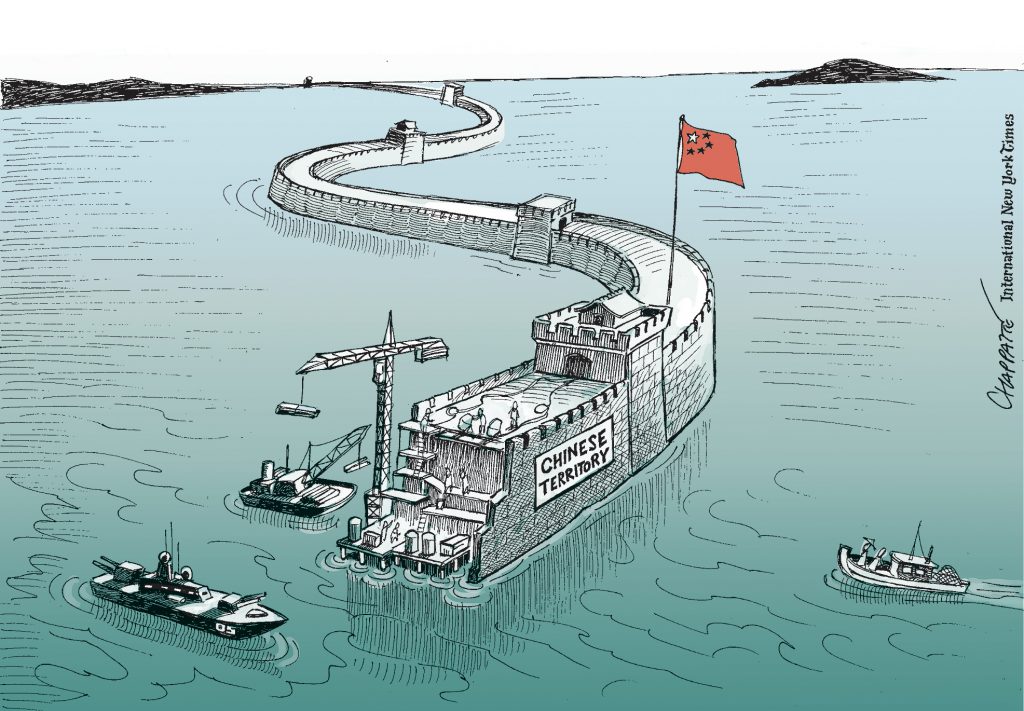Has globalisation reached its apex after centuries of growth as suggested by the latest figures of the WTO? In the affirmative, does this imply that we are ushering into a new era of degrowth? Or are we witnessing the reorganisation of the very architecture of globalisation, which remains based on the twin logic of the acceleration and continuous increase of the volume of exchanges, as well as the steady densification of geographic connectedness. Are global exchanges restructuring concomitantly to the fourth technological revolution and the expansion of the digital economy? The present Dossier proposes to approach this question by observing the nature and the evolution of the principal flows that characterize globalisation.
© Chappatte in The New York Times www.chappatte.com
The essays in this volume are the product of a new 'research practicum' course in the Department of Political Science and International Relations at the Graduate Institute in Geneva. They build on the debates on 'Urban Morphology and violence' to reflect on the associations between cities - their political orders and disorders - and outcomes ranging from occupation and resistance to marginalisation and containment. These texts foreshadow the possibility of centring - and challenging - the urban in our understanding of contemporary conflict, violence and peace. They are a first step in opening up a research agenda for a more textured analysis of spatial, geographical and temporal dynamics within the city in relation to violence, and, therefore, the mobilisation of spatial, temporal and visual modes of analysis. The promise is to make visible the varied roles of urban morphologies - adding to the debate on cities in and as sites of conflict.
-
I

Centring the Urban in Our Understanding of Violence
Reading time: 4 min -
1

Italian Hospitality
Reading time: 6 min -
2

Hybrid Political Orders in Urban Settings
Reading time: 5 min -
3

Aerial Occupation and Aerial Forensics in Gaza
Reading time: 4 min -
4

Naypyidaw, Myanmar: A Capital Devoid of Protests
Reading time: 4 min -
5

Planetary Conflict: Exploring the Urban Geography of Boko Haram
Reading time: 5 min -
6

Making Peace with Urban Political Settlements
Reading time: 5 min -
7

Informality as a Right to Necessity?
Reading time: 5 min -
8

Stagnation in the French Banlieues
Reading time: 5 min
While the global balance of power, under the impetus of the steady rise of China, is shifting towards the Asia-Pacific, and because the future of US policy is uncertain after the election of Donald Trump, tensions in the South China Sea have once again become a major strategic concern. The South China Sea is witnessing a series of sovereignty disputes between littoral states defending rivalling claims to maritime rights and boundaries. Adding weight and urgency to the disputes are the significant natural resources found in the coveted archipelagos and sea beds as well as the rising national sentiments in many of the claimant states. The geostrategic dimension of these quarrels is largely transcending the region and the involvement of external powers such as the United States further complicates the equation. The recent legal victory of the Philippines over China can be seen as a supplementary cause for anxiety in a latent conflict that may at any time escalate into a regional or global confrontation. Henceforth the search for a negotiated solution becomes crucial as military budgets continue to soar in the region.

